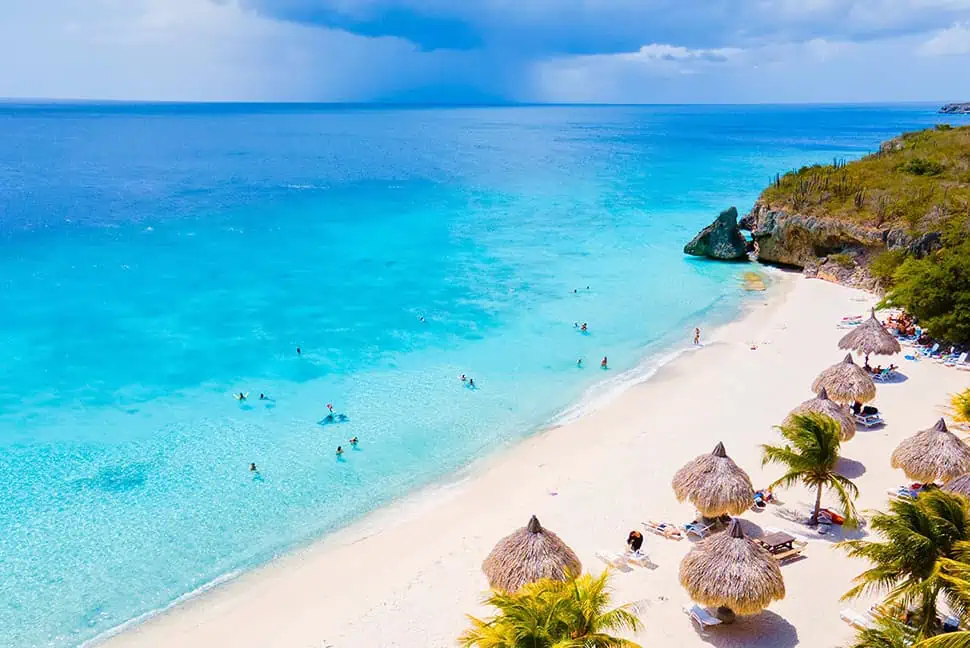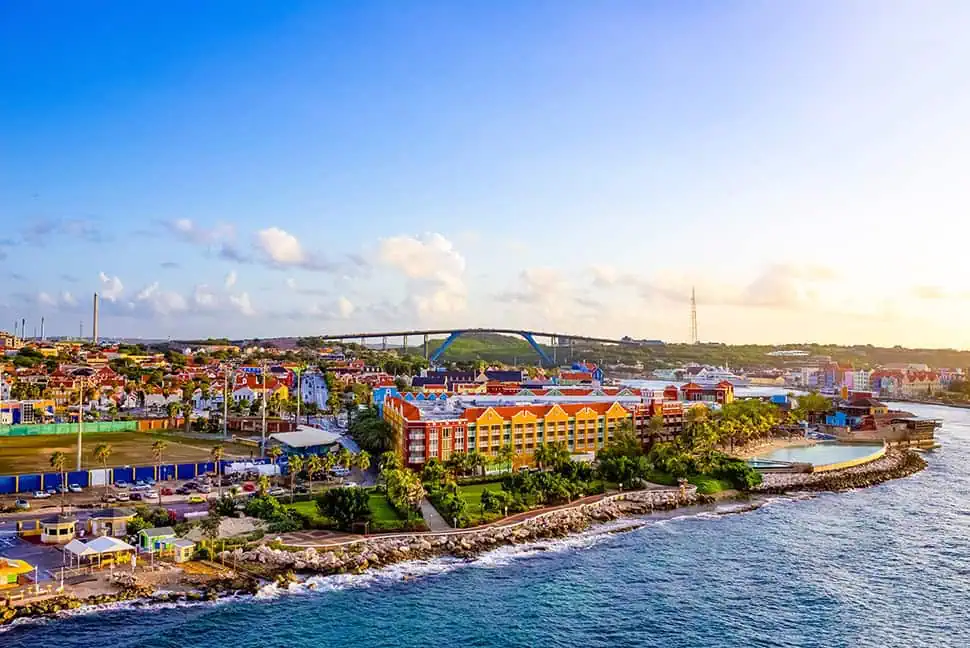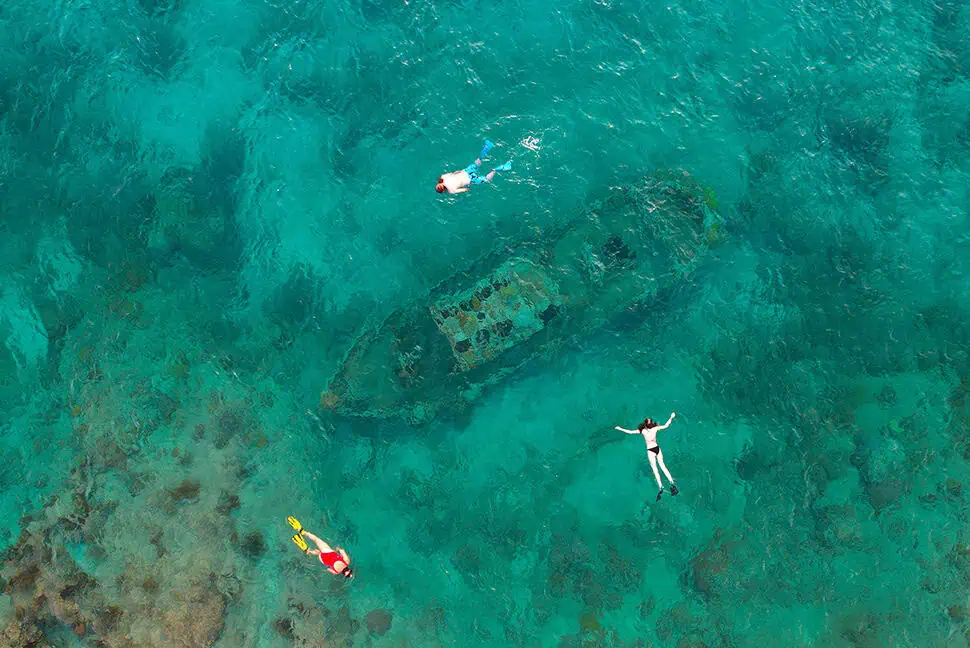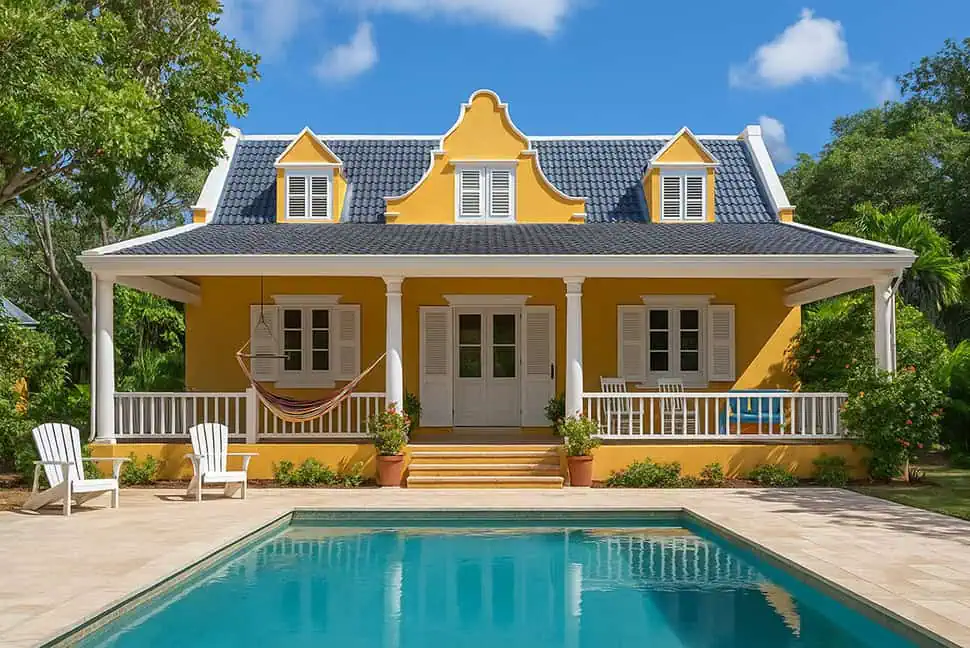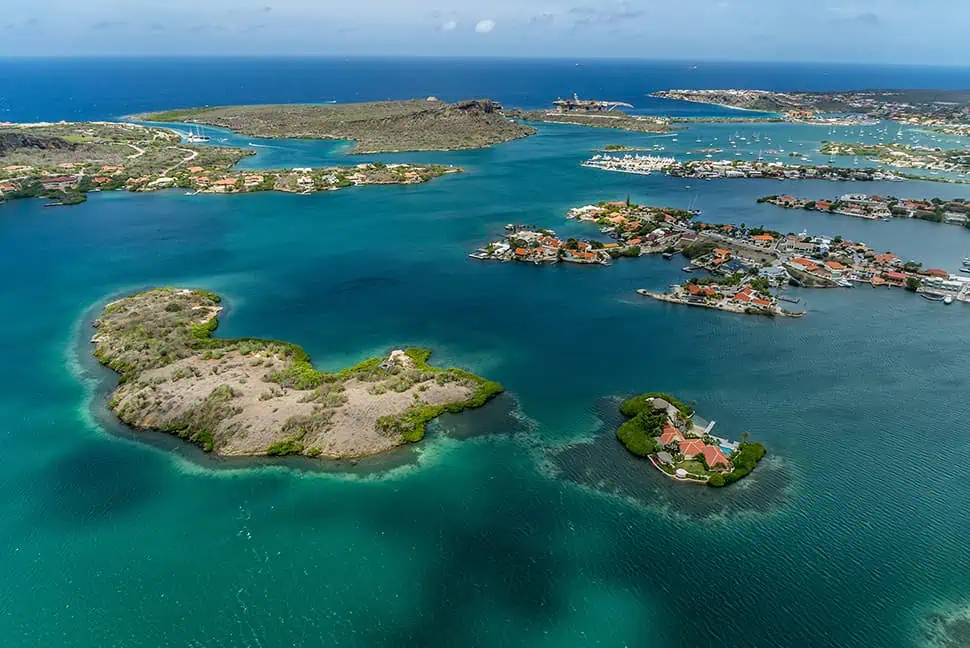So you're ready to buy property in Curaçao. Maybe you're a first-time buyer, perhaps you're upgrading, or you're finally pulling the trigger on that waterfront dream. Whatever brings you here, buying real estate is a big deal-and having the right information makes all the difference.
Here's what you need to know about buying property on our island, from the legal process to actual costs to choosing the right neighborhood.
Why buy Real Estate in Curacao?
Let's start with what makes the Curacao real estate market attractive-whether you're local, returning from abroad, or coming from elsewhere entirely.
The island life
Curaçao offers a warm, stable climate throughout the year, with temperatures averaging around 27°C. The island's compact size means the sea is never far away, and daily life tends to follow a bit more relaxed rhythm. Swimming, sailing, hiking, golf, and cycling are all common pastimes enjoyed throughout the week.
The island has a diverse and multilingual culture influenced by African, European, and Caribbean traditions. Events such as Carnival, music performances, and a large yearly film festival add variety.
Historical architecture remains well preserved, from colonial forts and plantation houses to the brightly colored buildings of Willemstad, a UNESCO World Heritage Site.
Curaçao's community is small and connected, with a friendly and open atmosphere that reflects the island's slower, more easygoing pace of life.
Listings on One Map.
Independent, Free, Easy to Use and, thanks to our AI, always up to date.
Find your new homeThe Legal Foundation Works
Curacao has got Dutch civil law backing everything, transparent legal processes, and genuine political stability as part of the Kingdom of the Netherlands. Property rights are clear and protected. The notary system ensures security. The Kadaster (Land Registry) provides certainty.
This isn't just good for foreign investors-it protects everyone who owns property here.
The Tax Situation
Transfer tax sits at 4%. Annual property taxes? Between 0.4-0.6% depending on your property's value. But here's the real advantage: sell your private residence and the appreciation is entirely tax-free. No capital gains. None. Whether you bought 5 years ago or 25, any increase in value stays in your pocket.
A Growing Market
Tourism tells an important story: 1.1+ million visitors in just the first eight months of 2025, up nearly 14% year-over-year. Hotel occupancy hovers around 73-79%, while vacation rentals can hit 65-83% occupancy with yields approaching 14% annually.
If you're considering rental income-whether as your primary strategy or just to offset ownership costs-these numbers matter.
And don't forget: Willemstad's historic center is a UNESCO World Heritage Site since 1997, featuring 743 listed monuments. Properties in these historic districts carry both cultural significance and appreciation potential.
Climate Advantage
We all know this, but it bears repeating: the last hurricane to directly hit Curaçao was September 23, 1877. Over 140 years ago. While our Caribbean neighbors board up windows every June through November, we enjoy consistent 27°C - 32°C weather and trade winds. That's not just quality of life-it's lower insurance costs and protected property values.
Real estate market in Curacao
Current Market Overview
There are more than 45 realtor websites on Curaçao. Our map brings together over 1500 real estate listings from these sites. Updated daily by our AI, it offers the most complete and up-to-date view of what local realtors currently have on offer in Curaçao.
If you're looking to buy, apartments range from $2,000 to $2,400,000, with an average price of $596,000. Homes for sale start around $106,000 and go up to $9,404,000, averaging $1,100,000. Keep in mind that Curaçao's strong luxury villa market pushes the average price up quite a bit - but there's no shortage of more budget-friendly homes as well.
For those interested in renting, apartments typically go for $300 to $4,200 per month, averaging $1,500. Homes for rent range from $600 to $6,800 per month, with an average of $2,200. The low end of the rental range mainly reflects student housing offered by some realtors.
We currently list 100+ homes and 190+ apartments for rent, as well as 530+ homes and 230+ apartments for sale on our map.
All prices are shown in USD. These numbers represent properties available through realtors. Curaçao also has a lively informal market where people sell or rent their homes privately - mostly through Facebook groups - and prices there tend to be lower.
Eigendom vs. Erfpacht: Understanding Your Options
If you're new to real estate here, this distinction is crucial.
Eigendom means full ownership-land and buildings both. You pay annual property tax and that's it. Maximum control, maximum security. This is what most people think of as "normal" property ownership.
Erfpacht is different. You own the building but lease the land from the government for 60 years with an annual canon (lease fee). About one-third of properties on the island are erfpacht. The lease can be freely sold, mortgaged, and transferred-and typically renews for another 60 years when it expires. With Erfpacht purchase prices run lower than comparable eigendom properties.
Which is better? Depends entirely on your situation. Building generational wealth and want absolute ownership? Eigendom makes sense. Want lower entry costs and comfortable with the lease structure? Erfpacht works beautifully and has been part of our system for decades.
Listings on One Map.
Independent, Free, Easy to Use and, thanks to our AI, always up to date.
Find your new homeWhere People Are Buying
Willemstad's Historic Districts
Punda, Otrobanda, Pietermaai, Scharloo-attract buyers who value UNESCO heritage. Pietermaai has transformed into the "SoHo of Curaçao" with boutique hotels and vibrant nightlife.
East Coast (Banda Ariba)
The neighborhoods Jan Thiel, Vista Royal and Jan Sofat, around the Spanish Water, remain the most sought-after area for beach lifestyle. Santa Barbara Plantation is Curaçao's most exclusive area on the east side of the island.
West Coast (Banda Abou)
Areas like Coral Estate and Westpunt offer tranquility, world-class diving, and often better value per square meter. Coral Estate is a 900-acre gated community where only 30% has been developed.
Central Residential Areas
Julianadorp, Mahaai, Emmastad and Damacor provide practical family-friendly options with easy access to schools, shopping, and work centers, avoiding the notorious traffic jams on the 'Caracasbaaiweg' and 'weg naar westpunt'.
The Buying Process: 8 Steps
Here's how this actually works, whether you're buying your first home or your fifth.
Steps 1 to 3: Search, View, and Offer
Browse our extensive, free, independent and easy to use overview of 1500+ real estate listings on the Island. Found something you like? Contact the Realtor and schedule a viewing, hire a professional inspector-don't skip this step, our tropical climate can hide issues-then make your offer and negotiate terms.
Step 4: The Purchase Agreement (With Protection)
Since January 1, 2012, all real estate purchases must be written. You'll sign a binding purchase agreement-but buyers get 3 full working days as a cooling-off period to back out for any reason whatsoever. For time-sharing apartments, that extends to 5 days.
This protects buyers from pressure tactics and gives you time to reconsider.
Step 5: The 10% Deposit Goes Into Escrow
You'll pay a 10% deposit (that's the legal maximum) into an escrow account held by your chosen notary. If you exercise that cooling-off period or if financing falls through, you get it back.
Step 6: Due Diligence
Your civil law notary does the heavy lifting here. Prior this took 6-8 weeks but unfortunately at the moment of writing (end of 2025) we are seeing delays of up to 3 months due to a shortage of notaries. Keep this in mind when planning things out. The notary will investigate the title at the Kadaster (Land Registry), verify ownership, check for mortgages, liens, or any encumbrances. They'll prepare the notarial deed (transport act) and coordinate all necessary documentation.
What do you need to provide? Valid ID (sedula or passport), proof of source of funds (bank statements), completed data forms, and additional documentation for AML/KYC compliance. Curaçao follows international anti-money laundering regulations, so notaries may request bank references, detailed source of funds documentation, and other due diligence materials. This compliance process can cause an extended timeline.
Steps 7 to 8: Signing and Registration
Both parties sign the transport act at the notary's office. You make the final payment (purchase price minus your 10% deposit), pay transfer tax and notary fees, and typically receive your keys immediately. The notary then registers everything with the Kadaster, officially transferring ownership.
Done. The property is yours.
Listings on One Map.
Independent, Free, Easy to Use and, thanks to our AI, always up to date.
Find your new homeThe Real Costs: What You'll Actually Pay
Let's break down the numbers clearly, because this matters more than asking price.
One-Time Closing Costs
- Transfer Tax: 4% of purchase price
- Notary Fees: 1-2% plus 8.5% surcharge and 6% sales tax (rates are fixed by the Court of Justice, so they're the same everywhere). The calculation works as follows: Base fee (1-2% of property value) + 8.5% surcharge on base fee + 6% sales tax on total = Final notary cost.
- Cadastre/Land Registry: a fixed fee of around $450 USD
- Appraisal: 0.2% to 0.25% of the property value (required if you're getting a mortgage)
Total closing costs typically run 5-7% of purchase price.
One tip: There's a 1% Central Bank license fee for transactions from resident accounts to non-resident accounts and for foreign currency purchases by residents. So in some cases it's worth checking whether your notary has accounts in euros or dollars to avoid this fee.
Annual Costs You'll Pay
Property tax (OZB) runs on progressive rates:
- 0.4% for properties up to XCG 350,000
- 0.5% for XCG 350,000 - XCG 750,000
- 0.6% above XCG 750,000
Plus insurance (home, contents), utilities (which we all know can run high with AC), HOA fees if applicable, and maintenance reserves.
Mortgage Options (2025 Rates)
Current mortgage rates hover in the 4.5-6% range. Banco di Caribe has promotional rates at 4.49%; Optimum sits at 4.75% fixed.
For residents: Typically 20-30% down payment, with banks financing 70-80% of market value. Terms extend up to 30 years with most lenders.
For non-residents: The requirements change significantly-you'll need 35-40% down (RBC Royal Bank requires 35% minimum; Banco di Caribe asks for 40%).
Major banks offering mortgages include:
- Maduro & Curiel's Bank (MCB) - largest bank on island, established 1916
- Banco di Caribe - competitive rates, good service
- RBC Royal Bank - over 115 years in the Caribbean
- Orco Bank - third largest, full service
- Optimum - fixed rates up to 35-year terms
Choosing the Right Professionals
You'll work with three key professionals during this process:
Real Estate Agents
Commission is typically 4%, paid by the seller (not you as the buyer). Major agencies include RE/MAX BonBini, Keller Williams, At Home, Sun Life Real Estate, and numerous boutique firms.
It's important to note that there are no formal regulations or licensing requirements for becoming a real estate agent in Curaçao - anyone can present themselves as one. Our platform simply indexes listings from as many sources as possible to provide a complete market overview. Inclusion on our map does not imply any form of endorsement. We therefore recommend being selective and doing some background research before choosing an agent or proceeding with a purchase.
Choose an agent based on their area specialization, responsiveness, and whether they understand your specific needs.
Notaries
The notary you choose matters. They're not just paperwork processors-they're sworn public officers appointed by the Dutch King who bear legal responsibility for clean title.
Choose based on experience, language capabilities (if needed), and whether they have foreign currency accounts (if relevant to your situation).
Currently there is a shortage of notaries on Curaçao, leading to significant delays in property transactions. In some cases, buyers have reported waiting several months for the completion of deeds and other required documents.
Property Inspectors
Worth every guilder. Our tropical climate, salt air, and older construction can hide termites, foundation issues, electrical problems, and more. A thorough inspection typically costs XCG 900-2,700 depending on property size, but can save you tens of thousands in unexpected repairs.
Special Considerations for Dutch, US, and Other International Buyers
If you're not currently a Curaçao resident or citizen, a few additional factors come into play:
Good News First: No Ownership Restrictions
Foreign buyers enjoy identical ownership rights as citizens. No alien landholding licenses. No special permits. No government approval needed. Both eigendom and erfpacht are fully available.
This puts Curaçao ahead of many Caribbean destinations that charge 10-12.5% alien landholding fees or restrict foreign ownership entirely.
For Dutch Nationals
Everything will feel familiar-you already know the Dutch civil law system, the notary process, and the legal framework. After 5 years of legal residency, you can apply for full Dutch citizenship.
For US Nationals
The legal system uses civil law (codified statutes) rather than common law. The Caribbean Guilder maintains a fixed peg at 1 USD = 1.78 XCG. Zero currency risk.
For International Buyers
Same story-no ownership restrictions, but non-resident mortgage terms apply (35-40% down). Multiple residency options available including Investor Permit Program.
Key Tax Considerations for US Buyers
You'll need to report worldwide income on Form 1040-including any Curaçao rental income. The good news? Direct real estate ownership isn't a "specified foreign financial asset" and doesn't require Form 8938. FBAR (FinCEN Form 114) only applies if foreign bank accounts exceed $10,000 total. You can deduct Curaçao property taxes on your US return. Banking here is FATCA-compliant since 2014.
Tax Considerations for Dutch Buyers
If you remain a Dutch tax resident, you'll report worldwide income to the Netherlands. If you become a Curaçao tax resident, our territorial system applies (only Curaçao-source income taxed here). The Investor Permit Program ($280,000+ investment) can provide a path to residency and, eventually, citizenship.
One difference from the Netherlands: erfpacht here offers 60-year fixed terms with canon fees locked in for the entire period-no periodic adjustments that can spike like they sometimes do back home.
Frequently Asked Questions
-
Can foreigners buy property in Curaçao without restrictions?
Yes. Foreign buyers enjoy identical ownership rights as citizens. No alien landholding licenses, no special permits, and no government approval needed. Both eigendom (full ownership) and erfpacht (long-term lease) are fully available to international buyers.
-
What's the difference between eigendom and erfpacht?
Eigendom means full ownership of both land and buildings with only annual property tax due. Erfpacht means you own the building but lease the land from the government for 60 years with an annual canon (lease fee). Erfpacht properties typically cost 20-30% less than comparable eigendom properties and the lease can be freely sold, mortgaged, and transferred.
-
How long does the buying process take?
The typical buying process should take 6-8 weeks from signing the purchase agreement to receiving your keys. This includes the 3-day cooling-off period, notary due diligence, title investigation at the Kadaster, and final signing of the transport act. However recently, due to a shortage of notaries, we have seen some month(s) long delays. So plan well ahead.
-
What are the total closing costs when buying property?
Total closing costs typically run 5-7% of purchase price. This includes 4% transfer tax, 1-2% notary fees (plus surcharges), $450 cadastre/land registry fees, and $300-500 for appraisal if getting a mortgage.
-
What down payment do I need for a mortgage?
For residents, banks typically require 20-30% down payment, financing 70-80% of market value. For non-residents, requirements increase to 35-40% down. Current mortgage rates hover in the 4.5-6% range with terms up to 30 years.
-
Are there capital gains taxes when I sell?
No. If you sell your private residence, any appreciation is entirely tax-free. No capital gains tax whatsoever. Whether you bought 5 years ago or 25, any increase in value stays in your pocket.
Now what?
Well.... you can start exploring properties right now on CaribbeanHouseHunt.com-we've aggregated 1,500+ listings from 50+ realtors so you can see the full market at once. it's independent, free, easy to use, and updated daily.
Listings on One Map.
Independent, Free, Easy to Use and, thanks to our AI, always up to date.
Find your new homeInformation Disclaimer
This guide was compiled using information from a large number of online sources. While we have made significant effort to ensure the accuracy and completeness of the information in this guide, it is provided for general informational purposes only. Laws, regulations, and market conditions may change, and individual circumstances can vary. We strongly recommend verifying details with qualified professionals such as a realtor, notary, or financial advisor, before making any property-related decisions.
